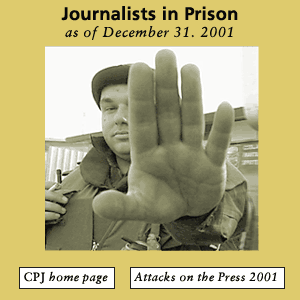
Attacks on the Press 2001: Journalists in Prison
There were 118 journalists in prison around the world at the end of 2001 who were jailed for practicing their profession. The number is up significantly from the previous year, when 81 journalists were in jail, and represents a return to the level of 1998, when 118 were also imprisoned.
NEWSPAPER EXECUTIVE MURDERED
New York, May 24, 2001 — Santiago Oleaga Elejabarrieta, chief financial officer of the regional daily El Diario Vasco, was shot dead this morning in the Basque port city of San Sebastián. The murder was widely attributed to the militant Basque separatist organization ETA. Oleaga, 54, was shot seven times in the head, neck, and…
Basque journalist injured by letter bomb
New York, May 15, 2001 — A Spanish journalist was severely injured after opening a letter bomb sent to his home in Zarauz, a town in the Basque region of northern Spain, near San Sebastian. While no one has claimed responsibility for the attack, most observers link it to the Basque separatist group ETA. Gorka…
Attacks on the Press 2000: Europe & Central Asia Analysis
POLITICAL REFORMS AND ECONOMIC GROWTH, along with the advent of democratic governments in Croatia and Serbia, brightened the security prospects for journalists in Central Europe and the Balkans. In contrast, Russian’s new government imposed press restrictions, and authoritarian regimes entrenched themselves in other countries of the former Soviet Union, particularly in Central Asia, further threatening…
Attacks on the Press 2000: Spain
PRESS FREEDOM IS GENERALLY RESPECTED IN SPAIN, and CPJ does not routinely monitor conditions in the country. However, a series of attacks on journalists by the Basque separatist group ETA, including the murder of a prominent columnist from the Madrid daily El Mundo, greatly alarmed journalists during 2000, forcing many to leave the Basque region…
Spain: Journalist assassinated in Basque country
Your Excellency, The Committee to Protect Journalists is deeply concerned about the recent assassination of political columnist José Luis López de la Calle. López de la Calle, a regular contributor to the Basque edition of the Madrid-based daily El Mundo, was gunned down outside his home on Sunday morning, May 7. Though no arrests have been made, Interior Ministry officials are reportedly attributing the crime to the Basque separatist group ETA.